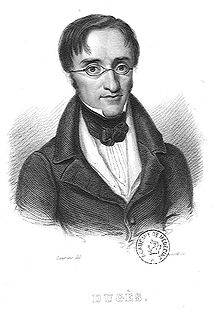Antoine Louis Dugès
| Antoine Louis Dugès | |
|---|---|

Antoine Dugès
|
|
| Born | Antoine Louis Dugès December 19, 1797 Charleville-Mézières, France |
| Died | May 1, 1838 (aged 40) Montpellier, France |
| Residence | France |
| Nationality | French |
| Fields | Zoology, Obstetrics |
| Institutions | University of Montpellier |
| Known for | Dugès, A. |
| Author abbrev. (zoology) | Dugès |
Antoine Louis Dugès (December 19, 1797 – May 1, 1838) was a French obstetrician and naturalist born in Charleville-Mézières, Ardennes. He was the father of zoologist Alfredo Dugès (1826–1910), and a nephew to obstetrician Marie Louise Lachapelle (1769–1821).
He studied medicine in Paris and began work as a prosector in 1820. In 1825 he received his agrégation, shortly afterwards being appointed professor of obstetrics at the University of Montpellier. In 1826, he published Manuel d'obstétrique, a textbook on obstetrics that was published in several editions. He was also responsible for the publication of his aunt's works on obstetrics.
As a zoologist, Dugès conducted osteological and myological studies of amphibians. He also performed extensive research of acarids (mites). In 1838, he published an influential work on comparative physiology, titled Traité de physiologie comparée.
He was a member of several learned societies, including the Académie de Médecine and the Académie des sciences de Paris. He died in Montpellier on May 1, 1838 at the age of 40.
The genus of freshwater planarians Dugesia is named after him.
...
Wikipedia
